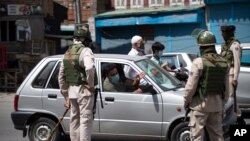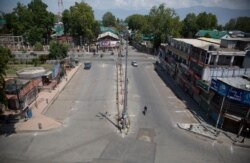Indian authorities have imposed a curfew in Indian-controlled Kashmir a day ahead of the first anniversary of revocation of the region’s partial autonomy. Authorities took action to prevent violent protests against a move that analysts say has deepened alienation in India’s only Muslim majority territory.
Razor wires and steel barricades blocked roads in the Kashmiri capital Srinagar on Tuesday, markets were shuttered and soldiers speaking into megaphones patrolled streets, asking people to stay home.
The two-day security lockdown was imposed in response to information about protests planned by anti-India groups to mark August 5 as "Black Day," according to Shahid Iqbal Choudhary, a civil administrator in Kashmir.
In the surprise move last year, India stripped its Jammu and Kashmir state of its special status and split it into two federally ruled territories. India said this would help restore peace and development to a region that lies at the heart of a conflict with Pakistan and has been wracked by a violent separatist insurgency since 1989.
But a year after Indian Kashmir faced the harsh security clampdown, there is little semblance of normalcy in the restive Himalayan valley, according to political analysts and rights groups.
“The very fact that they have imposed a curfew speaks of their own lack of confidence about the situation,” points out Noor Ahmad Baba, a professor of political science at Kashmir University. “There is deep resentment and frustration has been growing at the lack of any responsive system of governance. It has pushed us further away. We are still under various types of restrictions.”
Scores of separatist and mainstream political leaders and activists who were arrested remain in detention, including one of the state’s former chief ministers, Mehbooba Mufti.
High speed internet is still banned, making life especially difficult as the region copes with the coronavirus pandemic, according to residents and local journalists.
Human Rights Watch Tuesday said India continues to “impose harsh and discriminatory restrictions” on Muslim-majority areas in Jammu and Kashmir.
“[The] Indian government claims that it was determined to improve Kashmiri lives ring hollow one year after the revocation of Jammu and Kashmir's constitutional status," said Meenakshi Ganguly, South Asia director for Human Rights Watch. "The authorities instead have maintained stifling restraints on Kashmiris in violation of their basic rights.”
The rights group called on New Delhi to reverse its "abusive policies" in the region.
There is also deep resentment against a new law introduced in May that entitles non-Kashmiris, who have stayed or studied in the state for a certain period, to residency rights and government jobs. Kashmiris fear that it could alter the region’s demography as it overturns a nearly century-old policy under which outsiders could not buy land or become permanent residents.
A senior bureaucrat from Bihar, Navin Kumar Choudhary, was the first high-profile outsider to obtain residency in June.
“People here are apprehensive about it. They see it as an instrument of changing the identity of the state,” according to analyst Baba. He says Kashmiris feel their voice is not being heard. “The very basis of hope has been shattered. Hope comes through dialogue and understanding.”
The entire Kashmir region is claimed by India and Pakistan and has sparked two of three wars between them.
Islamabad says Kashmir is an internationally recognized dispute under a United Nations Security Council resolution and neither side can unilaterally alter its status. India describes its Kashmir-related measures as an internal matter.
Scrapping Kashmir’s special status had long been on the agenda of Prime Minister Narendra Modi’s Hindu nationalist Bharatiya Janata Party, or BJP. The move, taken just months after he won a second term, was hailed by people across much of India, but decried by critics who said it would not resolve the alienation in the insurgency-wracked region.
The entire Kashmir region is claimed by India and Pakistan and has sparked two of three wars between them.
Islamabad says Kashmir is an internationally recognized dispute under a United Nations Security Council resolution and neither side can unilaterally alter its status. India describes its Kashmir-related measures as an internal matter.
Exactly a year after his government’s radical step in Indian Kashmir, Modi is scheduled to attend a religious ceremony on Wednesday to mark the start of the construction of a Hindu temple in the northern town of Ayodhya in Uttar Pradesh. It is on the site of a mosque that was torn down by a Hindu mob in 1992.
Observers say this will be seen as another strong signal of the rise of Hindu nationalism under the BJP, which came to power in 2014.





